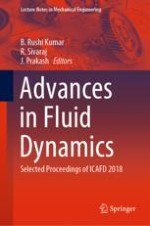2021 | OriginalPaper | Chapter
Numerical Investigation of Blood Flow in Idealized Abdominal Aorta with Renal Bifurcation Using Fluid–Structure Interaction
Authors : S. M. Abdul Khader, B. Raghuvir Pai, D. Srikanth Rao, K. Prakashini
Published in: Advances in Fluid Dynamics
Publisher: Springer Singapore
Activate our intelligent search to find suitable subject content or patents.
Select sections of text to find matching patents with Artificial Intelligence. powered by
Select sections of text to find additional relevant content using AI-assisted search. powered by
